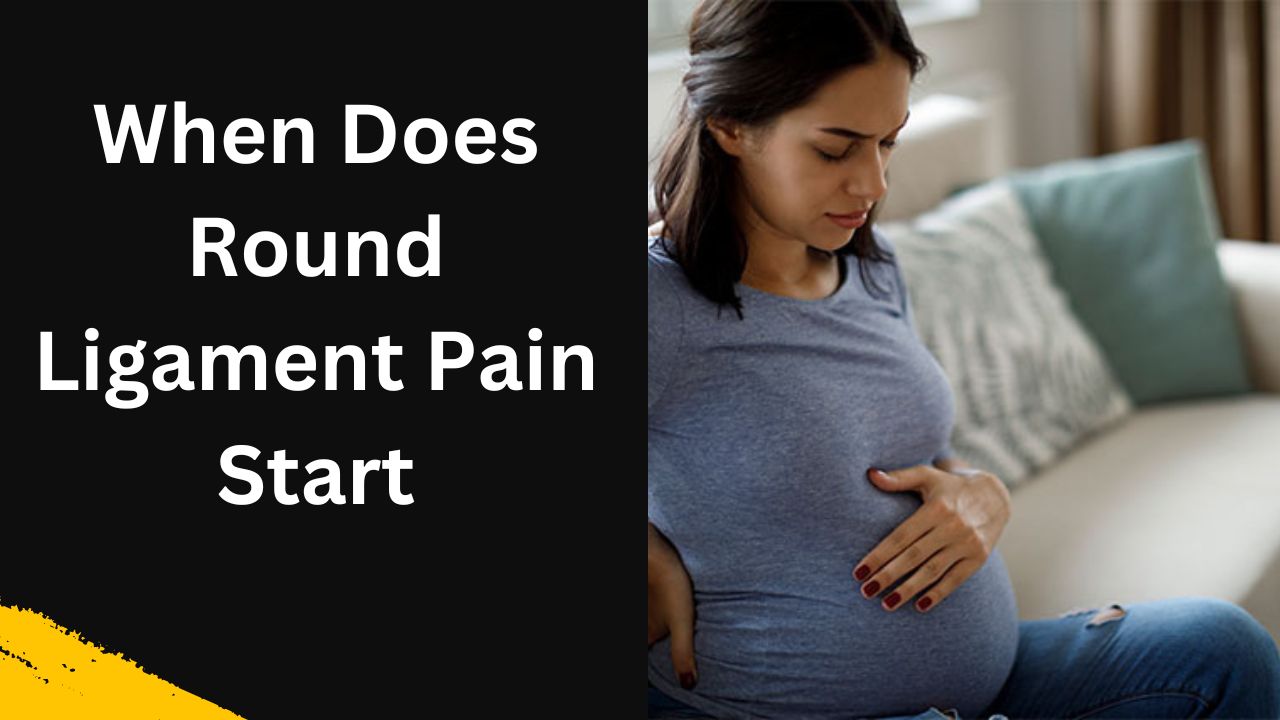Round ligament pain is a common discomfort experienced by some pregnant individuals, particularly during the second trimester of pregnancy. It is characterized by sharp, stabbing, or achy pain on one or both sides of the lower abdomen or groin area. Round ligament pain occurs for specific reasons related to the changes and growth of the uterus during pregnancy:
- Round Ligaments: The round ligaments are a pair of thick, fibrous cords that support the uterus and connect it to the groin area and the front of the pelvic bone. These ligaments play a crucial role in helping the uterus maintain its position within the pelvis.
- Uterine Growth: As pregnancy progresses, the uterus undergoes significant growth and expansion to accommodate the developing fetus. This growth causes stretching and increased tension on the round ligaments, which are responsible for supporting the uterus.
- Hormonal Changes: Hormonal changes, particularly the increase in the hormone relaxin, can contribute to ligament laxity or looseness. This hormonal effect allows the round ligaments to stretch more easily as the uterus grows.
- Movement and Position Changes: As the uterus enlarges, it shifts position within the pelvis. This movement and repositioning can put additional strain on the round ligaments, leading to discomfort or pain.
Round ligament pain typically occurs when pregnant individuals make sudden movements, such as rolling over in bed, standing up quickly, or changing positions. The pain is often described as sharp or stabbing and may be more noticeable on one side of the lower abdomen or groin.
While round ligament pain can be uncomfortable and even painful, it is usually a normal part of pregnancy and does not pose a threat to the developing fetus.
Table of Contents
When Does Round Ligament Pain Usually Begin?
Round ligament pain during pregnancy typically starts in the second trimester, which spans from approximately the 14th to the 26th week of pregnancy. However, the exact onset and timeline can vary among individuals. Here’s a general timeline for when round ligament pain is most commonly experienced during pregnancy:
- Early Second Trimester (14-18 Weeks): Many pregnant individuals may start to notice round ligament pain during the early to mid-second trimester. This is when the uterus begins to grow more rapidly, and the round ligaments start stretching to accommodate the expanding uterus.
- Mid-Second Trimester (19-22 Weeks): Round ligament pain tends to become more noticeable and frequent in the mid-second trimester as the uterus continues to enlarge. It may occur during activities that involve sudden movements or changes in position.
- Late Second Trimester (23-26 Weeks): By the late second trimester, round ligament pain can be a consistent discomfort for some individuals, particularly during movements like rolling over in bed, getting up from a sitting position, or standing up quickly.
While the second trimester is the most common period for round ligament pain, it’s essential to recognize that every pregnancy is unique, and the onset and severity of this discomfort can vary. Some individuals may start experiencing it earlier or later in the second trimester, while others may not experience it at all.
Symptoms and Characteristics:
Here are the key symptoms and characteristics of round ligament pain:
- Location: Round ligament pain typically occurs on one or both sides of the lower abdomen, often in the groin area. The pain is usually felt low down, below the belly button.
- Nature of Pain: Round ligament pain is often described as sharp, stabbing, or shooting. It can also be described as a sudden, intense, or pulling sensation in the lower abdomen.
- Sudden Onset: The pain associated with round ligament pain often comes on suddenly and without warning. It may be triggered by movements, position changes, or physical activity.
- Duration: The pain is usually brief, lasting for a few seconds to a couple of minutes. It tends to resolve quickly once the triggering movement or activity ceases.
- Intermittent: Round ligament pain is typically intermittent, meaning it comes and goes rather than being constant. It may occur with specific movements or activities and then subside.
- Unilateral or Bilateral: It can occur on one side of the lower abdomen or both sides simultaneously, depending on which round ligament is being stretched.
- Increased with Movement: Activities that involve sudden movements, such as rolling over in bed, standing up quickly, or changing positions, can exacerbate the pain. Movement-related activities are common triggers.
- No Associated Symptoms: Round ligament pain is typically not associated with other symptoms like fever, nausea, vomiting, or changes in bowel or urinary habits. It is isolated to abdominal discomfort.
- No Vaginal Bleeding: Unlike some other causes of abdominal pain during pregnancy, round ligament pain is not accompanied by vaginal bleeding.
- No Signs of Labor: Round ligament pain is unrelated to labor contractions. It is a distinct discomfort experienced during pregnancy, primarily during the second trimester.
Coping Strategies and Relief:
- Change Positions Slowly: To minimize the risk of triggering round ligament pain, make a conscious effort to change positions gradually. When getting out of bed or transitioning from sitting to standing, take your time and move slowly.
- Supportive Movements: When rolling over in bed or turning, bend your knees and engage your core muscles gently to support the lower abdomen. This can help reduce the strain on the round ligaments.
- Maternity Support Belt: Consider wearing a maternity support belt or belly band. These garments provide gentle support to the lower abdomen and can help alleviate discomfort by reducing the pull on the round ligaments.
- Rest: If you experience round ligament pain, take a break and rest. Lie down on your side with a pillow between your knees to provide additional support to the abdomen.
- Heat Therapy: Applying a warm compress or heating pad to the lower abdomen or groin area can help relax the muscles and ligaments, potentially providing relief from the pain.
- Gentle Stretching: Perform gentle stretching exercises that target the lower abdomen and pelvic area. Knee-to-chest stretches and pelvic tilts can be helpful.
- Hydration: Ensure that you stay well-hydrated throughout the day. Dehydration can exacerbate muscle cramps and discomfort, so drinking enough water is essential.
- Pregnancy Pillow: Use a pregnancy pillow to support your body while sleeping. These specially designed pillows can help maintain a comfortable sleeping position and reduce strain on the ligaments.
- Warm Bath or Shower: Taking a warm bath or shower can relax the muscles and provide relief from discomfort. Ensure that the water is not too hot, as overheating should be avoided during pregnancy
- Mindful Movement: Be mindful of your movements throughout the day. Avoid sudden or jerky movements, and if you need to lift something, bend at the knees and use your leg muscles instead of your abdomen.
- Prenatal Yoga: Consider joining a prenatal yoga class. Prenatal yoga can help improve flexibility, strengthen muscles, and promote relaxation, which can all contribute to managing round ligament pain.
- Breathing Exercises: Practice deep, diaphragmatic breathing to help relax the abdominal muscles and reduce tension.
When to Seek Medical Attention:
While round ligament pain during pregnancy is typically harmless and a normal part of the pregnancy experience, there are situations in which it may warrant medical evaluation. It’s essential to be aware of these circumstances and seek medical attention if you experience any of the following:
- Severe Pain: If you experience round ligament pain that is exceptionally severe and doesn’t subside with rest or position changes, it’s important to contact your healthcare provider. Severe, persistent pain could be a sign of another underlying issue that requires evaluation.
- Prolonged Pain: If the round ligament pain persists for an extended period and does not improve with rest, it may be a cause for concern. Prolonged discomfort may indicate an issue that needs medical assessment.
- Vaginal Bleeding: Any episode of vaginal bleeding during pregnancy should be evaluated by a healthcare provider, as it may be a sign of a more serious condition. Vaginal bleeding is not typically associated with round ligament pain.
- Fever: If you develop a fever along with round ligament pain, it could indicate an infection or other medical problem that requires prompt attention.
- Changes in Fetal Movement: If you notice a decrease in fetal movement or if your baby’s movements seem significantly different from what is typical for your pregnancy, contact your healthcare provider immediately. This could indicate fetal distress or other issues unrelated to round ligament pain.
- Persistent Symptoms: If you experience symptoms other than round ligament pain, such as nausea, vomiting, diarrhea, or changes in urination, or if you have any concerns about your pregnancy, it’s crucial to consult your healthcare provider.
- History of Preterm Birth: If you have a history of preterm birth or other pregnancy complications, any abdominal pain should be evaluated promptly, as it may indicate a heightened risk.
- Signs of Preterm Labor: Round ligament pain should not be confused with signs of preterm labor, such as regular contractions, a feeling of pressure in the lower abdomen, or a noticeable change in vaginal discharge. If you experience any of these symptoms, contact your healthcare provider immediately
- Worsening Symptoms: If your round ligament pain worsens over time or becomes more frequent, it is advisable to seek medical evaluation to ensure there are no underlying issues contributing to the discomfort.
It’s essential to communicate openly with your healthcare provider throughout your pregnancy and report any changes in your symptoms or concerns promptly. While round ligament pain is a common and benign discomfort, healthcare providers are trained to assess and address any potential complications or issues that may arise during pregnancy. Early evaluation and appropriate management can help ensure the well-being of both you and your baby.
In conclusion, round ligament pain is a common discomfort experienced during pregnancy, often starting in the second trimester. However, the onset can vary among individuals. If you’re pregnant and experiencing abdominal discomfort, it’s advisable to consult with your healthcare provider for personalized guidance and reassurance regarding round ligament pain and its management.
Frequently Asked Questions
Q1: Can round ligament pain be a sign of preterm Labour?
Ans: Round ligament pain is typically not a sign of preterm labour. However, if you experience any persistent pain or contractions, it is important to seek medical attention.
Q2: Can I prevent round ligament pain during pregnancy?
Ans: While round ligament pain is a normal part of pregnancy, there are some things you can do to reduce your risk of experiencing it, such as avoiding sudden movements and wearing supportive clothing.
Q3: How can I differentiate round ligament pain from other types of abdominal pain during pregnancy?
Ans: Round ligament pain is typically described as a sharp or dull pain on one or both sides of the lower abdomen or groin area. If you experience any other symptoms, such as fever or vaginal bleeding, it is important to seek medical attention.
Q4: Does the intensity of round ligament pain increase as pregnancy progresses?
Ans: Round ligament pain can become more frequent or intense as pregnancy progresses, typically peaking around weeks 18 to 24. However, the duration and frequency of the pain can vary from woman to woman.
Q5: Can round ligament pain affect my ability to exercise during pregnancy?
Ans: Mild to moderate round ligament pain should not affect your ability to exercise during pregnancy. However, if you experience severe pain or other symptoms, it is important to consult with your healthcare provider.




